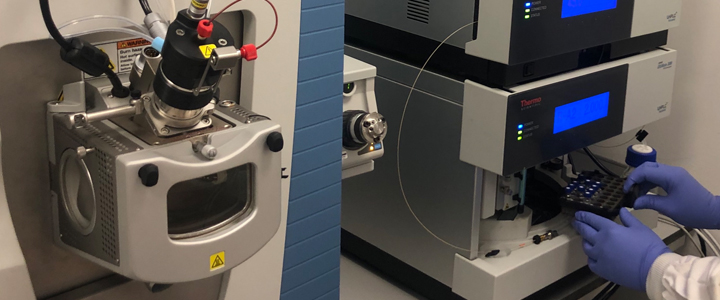
Stable Isotope Mass Spectrometry (SIMS) Facility
A facility housing 11 mass spectrometers of varying configuration to help with stable isotope tracing. The team has over 35 years' experience in using these highly sensitive approaches and is located in the Royal Derby Hospital.
Combining stable isotopes and mass spectrometry allows us to make dynamic measures of metabolism, principally in humans in health and disease.
We can also quantify and identify known (targeted) and unknown metabolites and proteins (untargeted) in a wide variety of sample matrices (blood, saliva, urine or tissue).
What are stable isotopes and how do we use them?
Stable isotopes are naturally occurring atoms, that contain extra neutrons, for example 13C/12C, 15N/14N, 18O/16O and 2H/1H – they are stable, non-radioactive, safe for use in humans, and when incorporated into metabolites e.g. amino acids, sugars or fatty acids, behave like the endogenous compound. Using mass spectrometry, we can trace their metabolism and make dynamic measures i.e. rates of turnover, flux through metabolic pathways, fuel utilisation.
We have extensive experience in the following areas:
- Using substrate specific isotope tracers to measure protein turnover, substrate oxidation and metabolic flux over acute periods (several hours)
- Development of simple non-invasive and less-invasive tracer approaches, using heavy water (2H2O) to measure protein synthesis over hours to months, energy expenditure, muscle protein breakdown and muscle mass from urine/saliva sampling – for application in free living humans and clinical populations
- Development of metabolomic (targeted and untargeted approaches) and proteomic analyses – when coupled with stable isotopes permits the dynamic measurement of metabolites (fluxomics) and proteins (Dynamic Proteomics)
Equipment
The unit is home to:
Liquid Chromatograph Mass Spectrometer (LC-MS)
Instruments:
- Thermo Scientific Q-Exactive Orbitrap LC-HRMS
- LTQ Orbitrap LC-HRMS
These instruments offer high resolution measurements (molecular mass down to 5 decimal places) for the analysis/quantification of both concentration and stable isotope labelling and are primarily used for metabolomics (fluxomics) and proteomics profiling (individual protein turnover).
Gas Chromatograph Mass Spectrometer (GC-MS)
Instruments:
- Thermo Scientific 1300-ISQ GC-MS
- Agilent 5973A GC-MS
- Two Fisons MD800 GC-MS
GC-MS is principally used for the quantitation of small molecules, e.g. amino acids, carbohydrates and lipid, and their metabolites (in a targeted manner).
They are also used to measure stable isotope enrichments from ~0.5 to 99%.
Gas Chromatograph Combustion/Pyrolysis Isotope Ratio Mass Spectrometer (GC-Combustion-Pyrolysis-IRMS)
Instruments:
- Thermo Scientific Delta Plus XL GC-C-IRMS
- Two Delta V Advantage GC-pyrolysis-IRMS
This equipment is capable of the measurement of extremely low-level isotope ratios of 13C/12C, 15N/14N, 18O/16O and 2H/1H (from 0.001 to 1%) as fixed gases i.e. metabolites separated by chromatography then combusted, reduced or pyrolised to CO2, CO, N2 or H2 gases.
In addition, we have a high Temperature Conversion – Elemental Analyzer (TC-EA) and an Elemental Analyzer (EA) linked to the IRMS. Which allow the injection of either liquid (TC-EA) or solid/dried (EA) samples for the sensitive measurement of C, N, H and O isotope ratios.
Gas Chromatograph tandem Mass Spectrometer (GC-MS-MS)
Instrument:
- Thermo Scientific 1310-TSQ GC-MS-MS
This system being a triple quadrupole, provides 10-100-fold greater sensitivity than our standard GC-MS, so can measure lower concentrations and enrichments, from 0.01 to 99%.
Continuous Flow-Isotope Ratio Mass Spectrometry
(CF-IRMS – breath gas system)
Instrument:
- Analytical Precision (AP2003)
This allows the sensitive measurement of isotope ratios 13C/12C, 15N/14N, 18O/16O as fixed gases. Primarily used for breath samples (substrate oxidation).